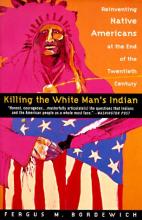
The author focuses on ending stereotyping of Native Americans. He assaults both anti-Native prejudice and liberal sentimentality and strives to re-write some of the histories with an eye on a fuller story. There are no good guy/bad guy stories, here, so that even the most tragic stories are told with an interest in how people behaved under the stress of cultural assault, rather than condemning the assaulters.(which he does but it isn’t his focus) So, for example, along with the Trail of Tears story, he tells of the black slave revolt on the Cherokee reservation in Oklahoma. (The Cherokee mixed bloods had inherited slaves from the white fathers and taken them with them on the Trail of Tears.) He speaks to support the rights of the Hopi when on a Navajo reservation, while expressing his shock at the mindless massacre of the California Native Americans by white settlers. His purpose seems to be to create a new American mindset where, accepting that the years of oppression, murders and rape have left people feeling victmized, and isolated, the possibilities of forming bridges across the oppression are a road to liberating all of us.Naive? Perhaps, but the stories are fascinating. Having seen the worst of Indian stereotypes in the movies, and then the depiction of the Lakota, under the sentimental treatment of Dances with Wolves, it was refreshing to read this book. Good reading.
